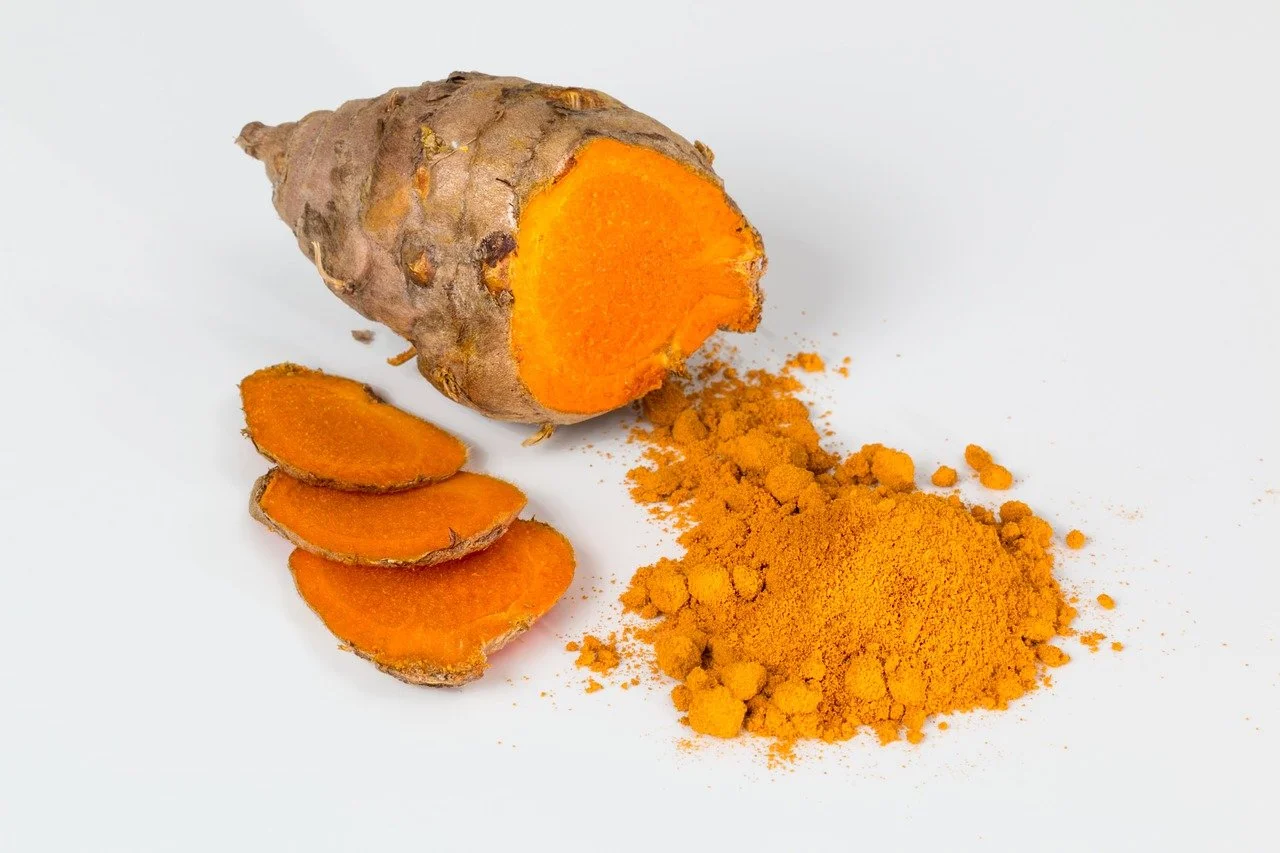Turmeric for PCOS: Fact or Fiction?
If you’ve looked into the use of herbal medicine for PCOS, you have probably come across people advocating for the benefits of turmeric for PCOS. You may have even seen recipes for turmeric tea or milk for PCOS and wondered if these drinks really work.
In this post, we are going to unpick the scientific evidence behind these claims and break down the benefits of turmeric for PCOS, how much you should consume and provide some practical advice on how you can include this spice in your diet.
What is turmeric?
Turmeric is a deep, golden orange rhizome (root) of a tropical plant native to Southeast Asia (1). Turmeric contains over 300 biologically active compounds which synergistically contribute to the health promoting benefits of this spice. One of the most potent compounds in turmeric are polyphenols, specifically curcuminoids (2). Approximately 70% of the curcuminoid content is made up of a compound called curcumin, which is thought to be the major active compound of turmeric (2).
Turmeric has been long recognised for its medical properties and has played a key role in herbal medicinal practices in a variety of cultures. Turmeric has recently received increasing interest in the scientific world due to evidence highlighting its antioxidant and anti-inflammatory effects (3). It has been shown to aid in the management of metabolic syndrome, anxiety and hyperlipidemia (high cholesterol and triglycerides in the blood) (3). Interestingly, curcumin has been associated with improved outcomes in various women’s health conditions such as PCOS, which we will explore in this post (1).
Turmeric benefits for PCOS
Several studies have investigated the benefits of turmeric for PCOS and have suggested that turmeric may be able to improve both the hormonal and metabolic characteristics of PCOS. As PCOS does affect quite a significant number of people with ovaries of reproductive age, finding a herbal remedy that may alleviate some of its symptoms may be of great benefit for this population.
Two randomised controlled trials in people with PCOS showed improved fasting blood sugar levels (4, 5), improved menstrual irregularities (4) and improvements in body weight and blood lipid levels (5) in those supplemented with turmeric compared to those not. Furthermore, a systematic review and meta-analysis published in 2021 provided evidence for the anti-inflammatory roles of turmeric, specifically curcumin, which may help resolve the low-grade chronic inflammation commonly associated with PCOS (6).
How much turmeric should I take?
Most of the evidence about the benefits of turmeric show that these effects are due to the amounts of curcumin available. However, it is important to note that taking curcumin on its own might not be the most effective way of supplementing as it has a low bioavailability; this means that your body cannot absorb and use the compound effectively (7).
Although there is currently no recommended amount of turmeric to consume, studies that reported a beneficial impact of supplementation tend to use a dose of 400-500 milligrams of circumin per day. This amount can be found in around 2 teaspoons of fresh turmeric but this may vary depending on the quality of the spice (7).
Supplements might be an easier way of getting an accurate dose of curcumin. When choosing a supplement, speak to your doctor or dietitian for advice on brands and dosages they recommend to make sure that you are getting the best out of your supplements (7).
Side effects of turmeric
Supplementing with turmeric tends to be relatively safe, with limited adverse effects reported with short term supplementation (8). Some of the side effects associated with turmeric include allergic reactions and gastrointestinal complications including pain, diarrhoea, nausea and vomiting (3). Although turmeric supplementation tends to be relatively low risk, it may need to be avoided by individuals with certain conditions such as kidney stones, diabetes and iron-deficiency. Turmeric may also interact with certain medications including blood thinners and diabetes medication so it is essential to consult with your doctor before taking any supplements (9).
It is important to note that these side effects are related to high dose turmeric or curcumin supplements and using turmeric as a spice in food tends to be safe for these individuals as well!
How can I include turmeric in my diet?
If you are looking at introducing more turmeric into your diet, it may be easier than you think. Turmeric is an extremely versatile spice that can be used to add flavour and a vibrant yellow colour to your cooking.
Here are some of our favourite ways of using turmeric:
Brew a batch of turmeric tea
Turmeric tea is a simple way to utilise either fresh or powdered turmeric
Simply boil 2 tbsp of fresh turmeric root or 2 tsp of turmeric powder in 1-2 cups of water for 5 minutes
You can also add some lemon and honey to adjust the taste to your liking
This drink can be enjoyed at any time of the day, so find a time to include this that works best for you!
Try making turmeric milk
Turmeric milk, also known as golden milk, is a warming drink of ground spices, milk and a sweetener of choice
There are lots of recipes online for different types of golden milk but some of the most common spices include turmeric, cinnamon, ginger and nutmeg
Get creative with your cooking
Turmeric is used quite commonly in several cuisines ranging from Indian to Middle Eastern, experiment with some new recipes to add this spice into your meals!
For a start, here is the recipe for our spinach and sweet potato dhal that is packed with turmeric and other warming spices.
Does it really work?
Based on the evidence currently available, it is clear that turmeric and its active ingredients have a positive impact on PCOS symptoms; however, more research is needed before this can be confirmed and a specific dose of turmeric can be recommended to the public.
For now, we recommend trying to include more turmeric in your cooking in order to get all the benefits from this spice, improving not only your PCOS, but general health as well.
If you want inspiration for another recipe that uses turmeric, why not check out our Moroccan inspired traybake?
If you would like 1-1 support in your fertility journey, get in touch to book a free discovery call.
References


